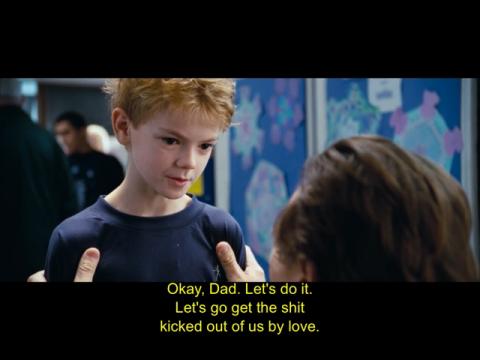Kindness changes the brain
I think I originally saw this “kindness changes the brain” quote in a pschologytoday.com article titled The Positive Psychology of Kindness.
I think I originally saw this “kindness changes the brain” quote in a pschologytoday.com article titled The Positive Psychology of Kindness.
I call this image, “Purple sky, with sunrise in the side view mirror.”
Sunrise on the road, December 10, 2013. Somewhere in Kansas.
Little drops of rain whisper of the pain
Tears of loves lost in the days gone by
My love is strong, with you there is no wrong
Together we shall go until we die
My, my, my, inspiration is what you are to me
Inspiration — look, see
And so today, my world it smiles
Your hand in mine, we walk the miles
Thanks to you it will be done
For you to me are the only one
Happiness, no more be sad
Happiness — I’m glad
~ Lyrics from the song Thank You, by Led Zeppelin, possibly my favorite band of all time. This is one of those songs where I can work while listening to it, no matter how loud you play it.
“It Couldn’t Be Done,” a poem by Edgar Guest. Former Broncos head coach Red Miller passed away recently, and he said that this became his motto.
So if you’re lost and on your own
You can never surrender
And if your path won’t lead you home
You can never surrender
And when the night is cold and dark
You can see, you can see light
Cause no one can take away your right
To fight and to never surrender
(Lyrics from the song Never Surrender, by Corey Hart. It was popular during my college bartending days, which was also a peak time for MTV and music videos.)

Chicago Cubs great Ron Santo passed away on December 3rd. Back in the day, he came to one of my baseball games, wearing his trademark leather jacket. Technically he went to his son’s game, but since I was pitching for the opposition and we won, it was my game. :)
My dad would have loved to meet Mr. Santo, but he stopped coming to my baseball games by that time, so he missed out on that. In fact, my mom, with all of her problems, was the last parent to see me in a baseball uniform. She came to see a game after I injured my shoulder, and it turned out to be my last game.
When I was in the hospital in Boulder, Colorado with the heart problem a few weeks ago, I asked a nurse about my cardiologist. I knew he had retired, but didn’t know why. “He’s 68 years old,” she said, “and he wants to spend more time with his girlfriend, who lives in Chicago.”
#HolidayLoveStory

“And so I wake in the morning
And I step outside
And I take a deep breath and I get real high
And I scream from the top of my lungs
What’s going on?”
I may have done that once or twice in the mountains of Alaska. :)
(P!nk also does a nice cover of this song.)
“When individuals are too self-centered, they tend to be prone to fear, suspicion, anxiety and anger. Compassion and restraining from harming others act as an antidote to this.”
~ the Dalai Lama
MastCellAware.com is a very well written and presented website about mast cell diseases. This image shows one section of this web page.
Two of the most important sentences for me are: “These mediators can cause a variety of unpredictable symptoms in both children and adults, including skin rashes, flushing, abdominal pain, bloating, nausea, vomiting, headache, bone pain and skeletal lesions, and anaphylaxis. Triggers can be heat, cold, stress (physical or emotional), perfumes or odors, medications, insect stings, and foods.”
I don’t know about everything shown on this image, but for the last few months I have noticed that I have “raccoon eyes” at times, meaning that I develop really dark areas under my eyes. As the image shows, this is probably from allergies and/or food intolerances, which — thanks to MCAS — I can now confirm.
(I found this image on this Pinterest page.)
A friend bought me some of these USB-powered Christmas lights, and I like using them in the winter months, especially on days when it’s snowing, like today. They’d also be a nice “under $20” gift for one of those White Elephant Christmas gift exchange parties.
My favorite Midsomer Murders episode is ... one that nobody else has ever seen. It keeps coming to me in a recurring dream. There’s something to do with a warm swimming pool, then Ben Jones is undercover, with a beard, dark/dirty skin, and unkempt hair. Then a group of people get in the back of a large car, including Jones, Tom Barnaby, and me. (It’s nice to be in the middle of an episode). It must be something like the back of a limousine, because there are five or six of us sitting in two rows, looking at each other and talking.
A little later there’s something about an oriental woman and some gold. Near the end of the episode Tom starts singing, and he sounds really good, but the group can’t get funding for what they’re doing, presumably putting on some kind of show, but a famous woman helps them out, something to do with a commercial. Cully is involved around this time, and there’s also a black bear named William Hanks (I don’t know where that came from). Joyce is involved at several points, especially the end, and fortunately she doesn’t cook anything. :)
At the end of the episode Tom is sitting in a chair, and I’m standing on his left and Joyce is standing on his right. I say to them, “This is the best episode ever, it’s much more of a movie than an episode.” Joyce agrees, and Tom doesn’t say anything, but sits there with a satisfied smile.
I’ve had this dream at least twice so far, and I look forward to seeing it again the next time it’s on. :)
Per Wikipedia, Kounis syndrome, also referred to as allergic angina, is “a group of symptoms that manifests as unstable vasospastic, nonvasospastic angina, or acute myocardial infarction and is triggered by the release of inflammatory mediators following an allergic insult.”
Lisa Klimas adds this: “The phenomenon we now called Kounis Syndrome has previously been called by names like morphologic cardiac reactions, acute carditis and lesions with basic characteristics of rheumatic carditis. It is sometimes still referred to as allergic angina or allergic myocardial infarction/heart attack depending upon the presentation. Allergic angina, which affected patients as microvascular angina, was first noted to progress to allergic heart attack in 1991.”
From my perspective as someone just learning about mast cell activation disease, it’s interesting to see that this was known in 1991, but mast cell activation diseases weren’t really recognized until 2007 to 2010.
Until yesterday I only knew a little about a song called Alice’s Restaurant ... the end of it is the only part I remember. But yesterday I learned that it’s a story about some events that started on Thanksgiving Day, 1965. (You can find the story here on Wikipedia.)
It’s a long song — more of a funny story than a song — but here you go, Alice’s Restaurant, by Arlo Guthrie:
A friend introduced me to the movie Home for the Holidays many years ago, and it’s still the best Thanksgiving movie I know.
The more I thought about it, the more I thought that the word pericarditis sounded familiar, so I searched an electronic diary I used to keep and found this entry from January 3, 2008:
“I don’t remember the whole dream, just the very end, where I woke up with the word ‘pericardium’ in my brain. There’s nothing too peculiar about this except for one detail: I don’t remember ever hearing that word before in my life.”
“Later in the morning I looked it up online to see if I made it up, and it is indeed a real word. Even cooler is that it’s related to the chest/heart, where my niece hit me. Wikipedia says it is ‘a double-walled sac that contains the heart and the roots of the great vessels.’”
“I'm not saying that I've never heard this word before, only that I can't consciously recall hearing it before, and I had to try several spellings before I got it right. What I’m saying is that my conscious mind didn’t know the word, but my dreaming mind did.”
The dreaming mind and subconscious in general fascinates me.
On Sunday, November 3, 2019, I had just finished lunch, looked at the clock, and saw that I could fit in about an hour of work before the Broncos game started. I was looking forward to see how Broncos’ quarterback Brandon Allen would do in his first career start.
A minute later I had severe chest pain. At first I thought I was having an allergic reaction to lunch — Wolfgang Puck’s potato soup, which I’ll never eat again — but I quickly realized it was something heart-related.
So I eventually got myself to the hospital. Because of the way the pain instantly came on I was guessing blood clot, but the doctors think it’s something called Pericarditis, as explained in this image.
(The last song I heard before going into the hospital was Someone Saved My Life Tonight, and while the lyrics don’t fit the event, I was hoping the title would be a good match.)
This is one of my favorite road signs in the world, the sign that points you to Los Alamos, New Mexico. For whatever reason, being in New Mexico is one of the things in life that makes me happy.